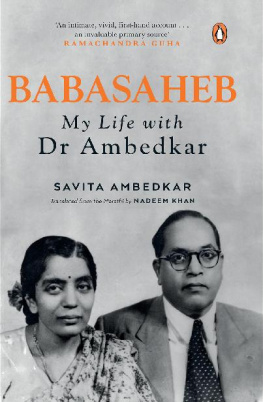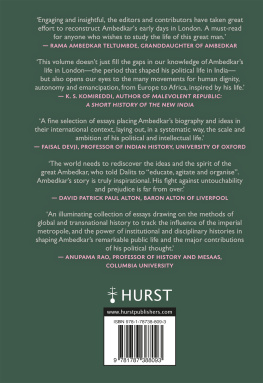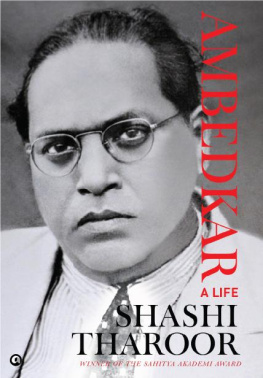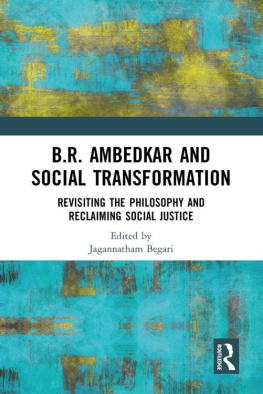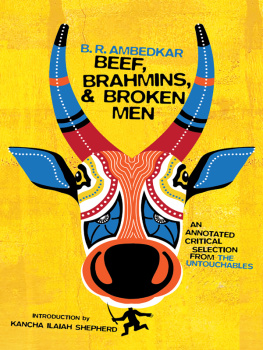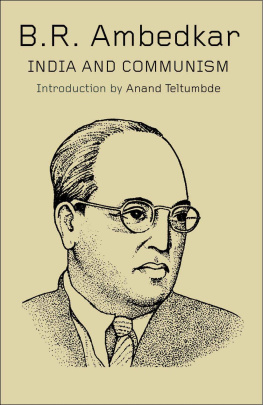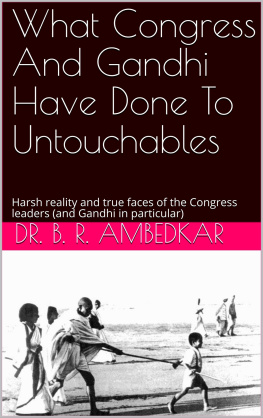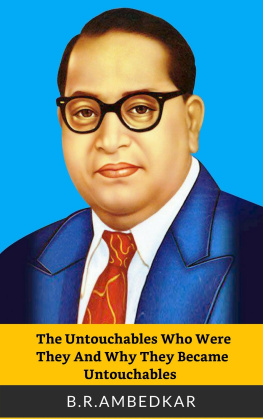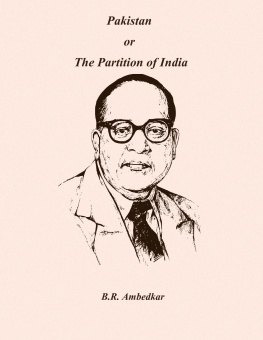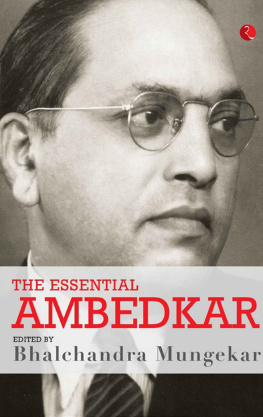SAVITA AMBEDKAR
BABASAHEB
My Life with Dr Ambedkar
Translated from the Marathi by Nadeem Khan
Contents
Advance Praise for the Book
One may be led to believe that everything that could be said about Dr B.R. Ambedkar and everything that he said has been told and written, by him or others close to him or distant enough to gauge him with a keen yet objective eye. Well, one would be wrong. What the translation of this hidden treasure reveals is stunning and at once extraordinary. It is a deeply personal account of the authors relationship with one of the doyens of the twentieth century, a relationship of both the heart and the mind, and it affirms, if at all an affirmation was necessary, that Dr Ambedkar was not part of an army of men but, rather, a one-man armyAnand Ranganathan, author and scientist
It is a stark reminder of the kind of erasure that has happened with history in India that so few know of the incredible story of Savita Ambedkar. This book is a timely reminder also that in eulogizing the great men of Indias past, we might still be forgetting to underline the role played by definitive women. Nadeem Khan has painstakingly done a meticulous job in bringing Savita Ambedkars story, the way she wanted to tell it, to us. This book deserves to be on every bookshelfHindol Sengupta, author and journalist
For more than thirty years, this invaluable primary source on Babasaheb remained accessible only to Marathi readers. This excellent English translation now makes this treasure house available to the rest of the world. I hope the autobiography of Savita Ambedkar will add a new dimension to our understanding of the life and works of Dr B.R. Ambedkar
K. Seetharama Rao, vice-chancellor, Dr B.R. Ambedkar Open University
As an intimate, vivid, first-hand account of the last eight years of Ambedkars life, this is an invaluable primary source, and Nadeem Khan has done us all a great service by translating it into EnglishRamachandra Guha, historian
Nadeem Khans translation is simply excellent. Babasaheb doesnt read as something thats been translated. It is some of the best translation work Ive seen out of India, if not the best. Excellent job!Scott R. Stroud, Ambedkar scholar and professor
We are familiar with the towering intellect of Dr Ambedkar, but this book by his partner, Savita Ambedkar, ne Sharada Kabir, offers a fascinating insight into his physical condition and emotional life, especially in his final decade. As the book progresses, the iconic Babasaheb who surrounds us on tall pedestals in public spaces becomes more accessible, intimate and human. A range of emotions are contained here: love, loneliness, dedication, despondency, surrender, sacrifice, prayer, intrigue, bitterness, betrayal and flashes of connubial bliss. These emotions are intertwined with complex questions of caste, religion, society, history and justice. Both Ambedkarites and others will find this book absorbingSugata Srinivasaraju, journalist, columnist and author
A reviled and dauntingly suspicious person in the Ambedkarite community, Savita Ambedkar is nevertheless a household name. She expected the mantle of Ambedkars leadership to be handed over to her as the great mans wife. Through this book, Savita inserts her rightful importance in the later life of Ambedkar as a faithful wife who served her great husband with all her might. A very good reminder that the hero of the oppressed was also ailing on account of his work and mental trauma caused by his political work. An intimate account of the lover and partner of a tender and soft-hearted Ambedkar. This book adds a very important perspective to Ambedkars biography, seen and experienced by his companion. Ambedkars romanticism and final years are a cue to history. This fine translation will absorb scholars, researchers and lay readers. A warm bookSuraj Yengde, University of Oxford and Harvard University, and author of Caste Matters
Mai has given an intimate eyewitness account of those critical years with Babasaheb when he was busy transforming the world. Without her, an extremely important segment of Babasahebs life would have remained unrevealed. Nadeem Khans wonderful translation of this exceptional book will carry the story of this extraordinary partnership to readers across the world. The translator cannot be thanked enough for this seminal workYashvant Manohar, Ambedkar scholar, Marathi poet and novelist
Translators Note
I had been vaguely aware that Dr B. R. Ambedkars second wife was a physician and she had died around 2005 (she actually died in 2003). Thus, when I found out eighteen years after her passing away that she had left behind an autobiography, I felt almost ashamed at my ignorance about Marathi books. My bruised self-esteem was somewhat salved when I later found that at least half of my friends, otherwise well-informed people, were ignorant even of the existence of Dr Ambedkars second wife. I received a bigger jolt when I read the publishing details page to find that Dr Ambedkaranchya Sahavaasaat was first published in 1990. I still havent been able to figure out how this Marathi book has been around for thirty-one years without being translated into English! Dr Bhimrao Ambedkar was, after all, among the greatest opinion-makers of the twentieth century and one of the most consequential Indian leaders of his time. Many Indian universities run study programmes on his work as a lifelong opponent of caste discrimination and as one who oversaw, guided and actually sat down and drafted the Constitution; Columbia University in New York, USA, offers a course on his life; the Buddhist peoples of the world recognize him as an important thinker on Buddhism. How, then, could such an intimate source on his life have remained inaccessible to non-Marathi readers in India and abroad across three decades of its existence?
My response to this question was a question I asked myself: Why look a gift horse in the mouth? I found the mobile number of Vijayrao Surwade who was listed on the copyright page as the editor, compiler, researcher and writing assistant of the Marathi book and visited him at his residence in the town of Kalyan. An affable gentleman, Vijayrao lives in a cosy little flat and exudes supreme contentment in being inundated by books overflowing his shelves; with files and documents stacked in plastic shopping bags flooding all the space that lies below: tables, chairs, stools, divan and window ledge. Vijayrao has the reputation of holding the biggest personal collection of photographs, documents, letters, reference works and other memorabilia related to Dr Ambedkar in the entire country, which, by extension, should mean the entire world. Not that I had wanted to doubt it, but a single look at all that lay spread around the flat settled the issue for me.
During this first visit, Vijayrao gave me a brief history of his close relationship with Dr (Mrs) Savita Ambedkar (ne Sharada Kabir), fondly addressed by her devotees as Maisaheb. He first met her in 1971 when he was a gawky eighteen-year-old studying at Siddharth College, Bombay, and Mai was the much-maligned widow of one of the greatest men of the century. She had been hounded by her detractors into spending fourteen years in the wilderness since the passing away of her illustrious husband in 1956, and had just returned to Bombay in the hope of reclaiming her rightful place in the hearts and minds of the people to whom she had committed her life. The sincerity, the energy and the utter selflessness with which young Vijayrao threw himself into Mais service made him in due course the most important crutch for her to lean on. Her autobiography was the direct outcome of the bond that was created between mentor and disciple across almost two decades. Knowing her to be a treasure house of memories and experiences of historical importance, Vijayrao begged, beseeched and badgered her till she relented and agreed to write her autobiographyon the condition that she would only talk and he would do all the writing. This is how the peculiar designation of writing assistant on the copyright page is explained.



